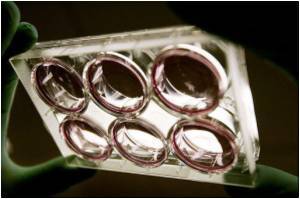A team led by researchers at National Jewish Health has discovered a new genetic variation that increases the risk of developing pulmonary fibrosis by 7 to 22 times.

Idiopathic pulmonary fibrosis (IPF) and familial interstitial pneumonia (FIP) are similar, invariably fatal diseases that involve progressive scarring of the lungs. The scarring prevents oxygen transport to the tissues, and most people die of respiratory failure within a few years of diagnosis. The diseases are relatively rare, but account for approximately 40,000 deaths each year, the same number as die of breast cancer. There is no approved treatment for the diseases.
Research into pulmonary fibrosis has been quite difficult. Little is understood about the biological roots of the diseases, and recent clinical trials of several experimental medications have failed to effectively treat them. Previous research has focused primarily on the scarring and inflammatory processes evident in the disease.
In the study funded by the National Heart, Lung and Blood Institute, National Jewish Health researchers and their colleagues took an "agnostic" approach, statistically analyzing the entire genome of 82 afflicted families. They found an association with the diseases in a region of chromosome 11 that contains four mucin genes involved in the production of mucus. Narrowing their search with fine mapping, then sequencing, they eventually found a common variation near the MUC5B gene, presumably in a regulatory element, that is strongly associated with the disease.
"This research suggests that mucus production where the small airways and the air sacs converge may play a significant role in pulmonary fibrosis," said senior author David Schwartz, MD, Chair of the Department of Medicine at the University of Colorado School of Medicine and Director of the Center for Genes, Environment and Health at National Jewish Health.
The variation exists in 19 percent of healthy controls, 59 percent of FIP patients, and 67 percent of IPF patients. Carrying one copy of the gene increases the risk of developing FPF by 6.8 times, and IPF by 9.0 times. Carrying two copies of the variation increases risk 20.8 times and 21.8 times, respectively.
Advertisement
"There are several biologically plausible ways in which excess mucus could cause disease," said Dr. Schwartz. "We are currently investigating all of these mechanisms as potential causes of disease."
Advertisement
Source-Eurekalert












